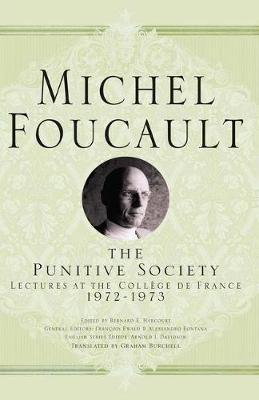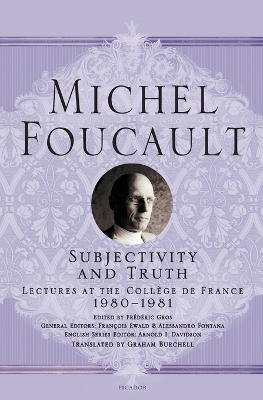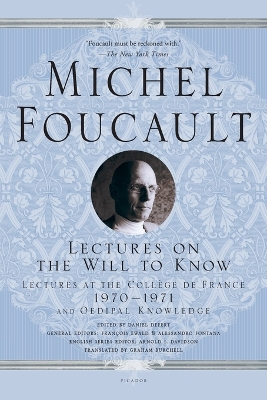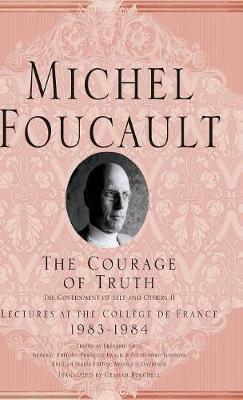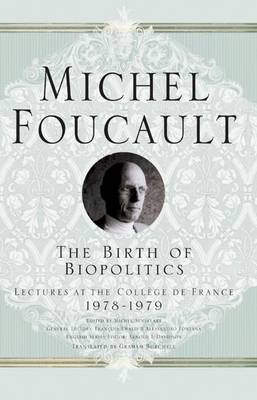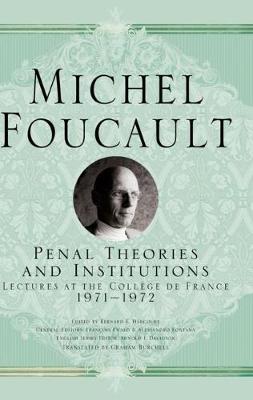Michel Foucault, Lectures at the College de France
2 primary works • 6 total works
Book 2
These thirteen lectures on the 'punitive society,' delivered at the College de France in the first three months of 1973, examine the way in which the relations between justice and truth that govern modern penal law were forged, and question what links them to the emergence of a new punitive regime that still dominates contemporary society.
Book 12
"The working hypothesis is this: it is true that sexuality as experience is obviously not independent of codes and systems of prohibitions, but it needs to be recalled straightaway that these codes are astonishingly stable, continuous, and slow to change. It needs to be recalled also that the way in which they are observed or transgressed also seems to be very stable and very repetitive. On the other hand, the point of historical mobility, what no doubt change most often, what are most fragile, are modalities of experience." - Michel Foucault In 1981 Foucault delivered a course of lectures which marked a decisive reorientation in his thought and of the project of a History of Sexuality outlined in 1976. It was in these lectures that arts of living became the focal point around which he developed a new way of thinking about subjectivity. It was also the moment when Foucault problematized a conception of ethics understood as the patient elaboration of a relationship of self to self. It was the study of the sexual experience of the Ancients that made these new conceptual developments possible.
Within this framework, Foucault examined medical writings, tracts on marriage, the philosophy of love, or the prognostic value of erotic dreams, for evidence of a structuration of the subject in his relationship to pleasures (aphrodisia) which is prior to the modern construction of a science of sexuality as well as to the Christian fearful obsession with the flesh. What was actually at stake was establishing that the imposition of a scrupulous and interminable hermeneutics of desire was the invention of Christianity. But to do this it was necessary to establish the irreducible specificity of ancient techniques of self. In these lectures, which clearly foreshadow The Use of Pleasures and The Care of Self, Foucault examines the Greek subordination of gender differences to the primacy of an opposition between active and passive, as well as the development by Imperial stoicism of a model of the conjugal bond which advocates unwavering fidelity and shared feelings and which leads to the disqualification of homosexuality.
Within this framework, Foucault examined medical writings, tracts on marriage, the philosophy of love, or the prognostic value of erotic dreams, for evidence of a structuration of the subject in his relationship to pleasures (aphrodisia) which is prior to the modern construction of a science of sexuality as well as to the Christian fearful obsession with the flesh. What was actually at stake was establishing that the imposition of a scrupulous and interminable hermeneutics of desire was the invention of Christianity. But to do this it was necessary to establish the irreducible specificity of ancient techniques of self. In these lectures, which clearly foreshadow The Use of Pleasures and The Care of Self, Foucault examines the Greek subordination of gender differences to the primacy of an opposition between active and passive, as well as the development by Imperial stoicism of a model of the conjugal bond which advocates unwavering fidelity and shared feelings and which leads to the disqualification of homosexuality.
Lectures on the Will to Know reminds us that Michel Foucault's work only ever had one object: truth. Here, he builds on his earlier work, Discipline and Punish, to explore the relationship between tragedy, conflict, and truth-telling. He also explores the different forms of truth-telling, and their relation to power and the law. The publication of Lectures on the Will to Know marks a milestone in Foucault's reception, and it will no longer be possible to read him in the same way as before.
The Courage of the Truth is the last course that Michel Foucault delivered at the Collège de France. Here, he continues the theme of the previous year's lectures in exploring the notion of "truth-telling" in politics to establish a number of ethically irreducible conditions based on courage and conviction. His death, on June 25th, 1984, tempts us to detect the philosophical testament in these lectures, especially in view of the prominence they give to the themes of life and death.
Michel Foucault's lectures at the College de France in 1979, The Birth of Biopolitics, pursue and develop further the themes of his lectures from the previous year, Security, Territory, Population. Having shown how Eighteenth century political economy marks the birth of a new governmental rationality -- seeking maximum effectiveness by governing less and in accordance with the naturalness of the phenomena to be governed -- Michel Foucault undertakes the detailed analysis of the forms of this liberal governmentality. This involves describing the political rationality within which the specific problems of life and population were posed: "Studying liberalism as the general framework of biopolitics". What are the specific features of the liberal art of government as they were outlined in the Eighteenth century? What crisis of governmentality characterises the present world and what revisions of liberal government has it given rise to? This is the diagnostic task addressed by Foucault's study of the two major twentieth century schools of neo-liberalism: German ordo-liberalism and the neo-liberalism of the Chicago School.
In the years he taught at the College de France, this was Michel Foucault's sole foray into the field of contemporary history. This course thus raises questions of political philosophy and social policy that are at the heart of current debates about the role and status of neo-liberalism in twentieth century politics. A remarkable feature of these lectures is their discussion of contemporary economic theory and practice, culminating in an analysis of the model of homo oeconomicus. Foucault's analysis also highlights the paradoxical role played by "society" in relation to government. "Society" is both that in the name of which government strives to limit itself, but it is also the target for permanent governmental intervention to produce, multiply, and guarantee the freedoms required by economic liberalism. Far from being opposed to the State, civil society is thus shown to be the correlate of a liberal technology of government.
In the years he taught at the College de France, this was Michel Foucault's sole foray into the field of contemporary history. This course thus raises questions of political philosophy and social policy that are at the heart of current debates about the role and status of neo-liberalism in twentieth century politics. A remarkable feature of these lectures is their discussion of contemporary economic theory and practice, culminating in an analysis of the model of homo oeconomicus. Foucault's analysis also highlights the paradoxical role played by "society" in relation to government. "Society" is both that in the name of which government strives to limit itself, but it is also the target for permanent governmental intervention to produce, multiply, and guarantee the freedoms required by economic liberalism. Far from being opposed to the State, civil society is thus shown to be the correlate of a liberal technology of government.
